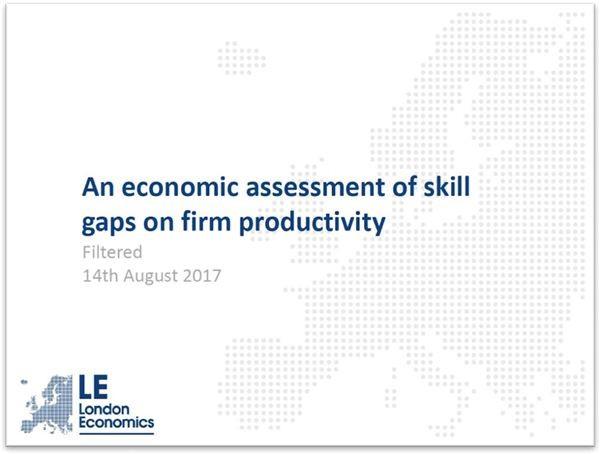
London Economics shines light on skills gaps holding back UK productivity
Leading economics consultancy London Economics has analysed the to identify and quantify how shortfalls in skills are impacting UK firms through loss of business to competitors, delayed development and increased operating costs.
"This detailed analysis of the consequences of skills gaps, according to type of skill, size of skill gap, business sector, size and geography is allowing Filtered to increase the precision of its prioritisation of learning content for our corporate clients" said Chris Littlewood, Filtered's Chief Scientific Officer. "Being able to link skills gaps to tangible outcomes, like deals lost to the competition, brings home the urgency of the problem - it's a productivity imperative not a productivity puzzle."
London Economics conducted both descriptive and econometric analysis of the Employer Skills Survey 2015, which is based on over 90,000 interviews with firms of all sizes and sectors across the UK. The resulting correlations have been incorporated into , prioritising learning content recommendations with a likely higher impact on client firm's productivity.
Sophie Hedges, the lead economist undertaking the analysis at London Economics, said "the new analysis of the ESS illustrates both the incidence and the adverse impact on firm-level performance associated with a range of different skills gaps. The analysis also provides a strong rationale for firms, irrespective of their size, to invest in skills to rectify the potential negative consequences."
Insights include:
- Skills gaps in reading and understanding increases the probability that the establishment will lose business to competitors by 6.2 percentage points compared to an establishment with no skills gap in reading and understanding.
- In fact, reading and understanding consistently appears as one of the strongest drivers of negative firm outcomes.
- For SMEs, the incidence of skills gaps increases with firm size (tiny firms tend to be appropriately skilled, but as firms get bigger matching skilled resource to requirements seems to become harder). (Small firms report an incidence of skills gaps of just 2%, compared to 7% for firms with more than 250 employees.)
- But when skills gaps do occur in very small firms, they are more likely to have a major impact (a major impact was reported in 23% of firms where skills gaps were identified).
- Gaps in IT/computer literacy, basic numeracy and complex numerical skills also increase the probability of increasing workload for other staff (by 6.4, 5.2 and 4.1 percentage points respectively).
Filtered are making the research freely available in the hope that it provides a platform for further innovation. Get in touch if you are interested in access or collaboration.
Links
To the research:
To Filtered's learning recommendation engine, globalfilter:
Media contact
Paolo Lenotti
Head of Marketing & PR, Filtered
+44 (0)7450 948685
About Filtered
Filtered is an award winning, Shoreditch-based company, focused on using technology to personalize learning for the world's knowledge workers. Its platforms tailor the learning experience of each individual, increasing the impact of training and reducing the time taken to reach proficiency in essential business skills. Since its inception Filtered has served almost 1 million consumers and a growing list of multinational businesses, including EY, PwC, Groupon, EE, New Look and many more.
Filtered won two awards at the Learning Awards 2016 (in the Learning Technologies and Innovation in Learning categories), and with the ICAEW was shortlisted for Best Training Initiative in the Association Excellence Awards 2016. In 2017 Filtered won funding from Innovate UK to develop an algorithm stack that supports skills development for productivity.
Filtered is supported with investment from the City & Guilds Group.
For further information visit .
About London Economics
London Economics advises clients in both the public and private sectors on economic and financial analysis, policy development and evaluation, business strategy, and regulatory and competition policy. The London Economics Labour Markets team has extensive experience in the labour markets arena, having undertaken many high profile projects ranging from the evaluation of policy interventions (such as the London Living Wage) to the analysis of labour market outcomes achieved by individuals in possession of different qualifications or in receipt of different active labour market policies. Clients include central government Departments and Non-Departmental Public Bodies, the European Parliament, European Commission and the OECD.
For further information visit .
Legal Disclaimer:
MENAFN provides the
information “as is” without warranty of any kind. We do not accept
any responsibility or liability for the accuracy, content, images,
videos, licenses, completeness, legality, or reliability of the information
contained in this article. If you have any complaints or copyright
issues related to this article, kindly contact the provider above.


















Comments
No comment